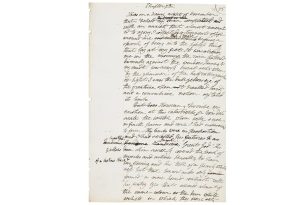Radicals often think of writing primarily as an act of provocation — a bullet in the chest of the bourgeoisie. No doubt, writing can provoke, and one doesn’t need to be a radical to know this, as any reader of Tom Wolfe will tell you. But to provoke in writing, particularly literary writing, is at once to provoke and to conserve a provocation. To write is a tacit acknowledgment that something is worth keeping. Otherwise, one could simply shout.
What else does writing conserve? All sorts of things, of course, but in literature, it conserves feelings, perceptions, the lives and actions of people or a way of life. It conserves ideas that one hopes won’t be burned to a crisp on the streets of Avignon.
This shouldn’t be a controversial point — there are thousands of remarks from writers to the above motive. Here are a few pulled pell-mell from books at hand: Herodotus wrote Histories, he tells us, so that “human achievements may not become forgotten in time.” “The deep flood of time will roll over us,” Seneca wrote Lucilius in one his letters, but in writing “some few great men will raise their heads above it, and, though destined at the last to depart into the same realms of silence, will battle against oblivion and maintain their ground for long.” Petrarch writes a letter “To Posterity” in case his “obscure name” travels over the distance of “place or time” and readers “desire to know what sort of man I was.”
A frequently recurring trope in Shakespeare’s sonnets is that writing gives its subjects a kind of immortality. In The Prelude, Wordsworth writes that he hopes to “fix in visible home” the “many feelings” that “oppressed” his “heart.” Czeslaw Milosz tells us that he long put off writing about his childhood until he realized “it was getting late—in the history of our shrinking Earth, in the history of a life.” Lorine Niedecker’s poetry is a record of the sounds and textures of Black Hawk Island. Iris Origo tells us in the introduction to her autobiography that she is not writing “to convert, to reveal, or to confess” but “to set down a fragmentary account of what it has been like to live in three totally distinct periods of civilization.”
That’s all well and good, you may think, but how much of Herodotus is history and how much is something closer to invention, filtered as it is through a point of view inescapably marred by personal and political biases? Isn’t one of the lessons of Faulkner’s Absalom, Absalom! that the past is unknowable except to those who lived it, and even then, merely as an obscure feeling? Wordsworth may have hoped to “fetch / Invigorating thoughts from former years” and “fix the wavering balance of my mind” in verse, but he goes on to say that “should these hopes / Be vain,” we are to forgive him because at least these “recollected hours” may have “the charm / Of visionary things.” The implication is that we should judge his great poem of the mind — a poem, of course, that he never completed and to which The Prelude was supposed to have been merely that — not by its truth but by its beauty.
In the first volume of his Rules of the Game, the French anthropologist Michel Leiris addresses the difficulty of capturing the past — “to bring back to life, under the tip of my pen, what is really no more than a set of needle points” — or even the present in writing. It seems impossible: “If I try to give substance to this present moment—to this very presence—it immediately hides.” Leiris suggests that perhaps it doesn’t matter if he catches his “prey” or not. What matters is the “hunt” or the “game.” After all, this “game” that is “the only affecting element” of his prose. Perhaps the object of writing is not the past at all but simply the game itself.
Yet, what follows is not a single book but three volumes of the memories, events, sights, smells, and people of his life. In the middle of the first volume, Leiris lets his guard down somewhat. He hopes he has articulated the images of his memory in such a way as to “give them a meaning” and locate “a common denominator between this time and my life.”
This attempt may be imperfect, as all attempts to capture anything in writing are, but Leiris’s The Rules of the Game only pleases to the degree that it rings true. For his part, the painter Francis Bacon found that Leiris succeeded well enough: “For me his work is not only a document that enriches our knowledge of man, but also a personal testament that touches me deeply.”
The point is not that writing is only an act of conservation, but it is at least this, and all writers are conservative in this limited sense.


















